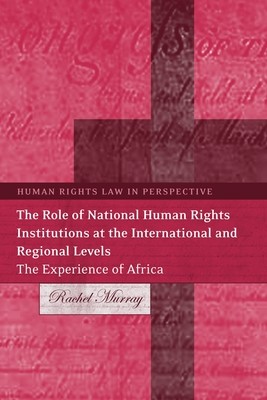
- We will send in 10–14 business days.
- Author: Rachel Murray
- Publisher: Bloomsbury Publishing PLC
- Year: 2007
- Pages: 137
- ISBN-10: 1841133949
- ISBN-13: 9781841133942
- Format: 15.6 x 23.4 x 1 cm, hardcover
- Language: English
- SAVE -10% with code: EXTRA
Role of National Human Rights Institutions at the International and Regional Levels (e-book) (used book) | bookbook.eu
Reviews
Description
National Human Rights Institutions (NHRIs), defined by the UN as bodies established to promote and protect human rights, have increased in number since the General Assembly adopted principles governing their effectiveness in 1993. The UN and others have encouraged states to set up such institutions as an indication of their commitment to human rights, and now over 20 such institutions exist in Africa and many more will follow. These institutions have taken various forms including ombudsmen, commissions, or a combination of the two. They differ in terms of how they are established - some by constitution, some by legislation, and some by decree. These NHRIs have varying functions, usually both promotional and protective, such as giving advice to governments, making recommendations on compliance with human rights standards, raising awareness, and analyzing law and policy. Despite the considerable variations in the method of their creation, powers, and composition, most of these institutions have chosen - or indeed been mandated - to become involved in international and regional forums. This book examines these institutions in the African region, the way in which they use the international and regional forums, the effectiveness of their contributions, and how they are able to participate.
EXTRA 10 % discount with code: EXTRA
The promotion ends in 13d.18:01:10
The discount code is valid when purchasing from 10 €. Discounts do not stack.
- Author: Rachel Murray
- Publisher: Bloomsbury Publishing PLC
- Year: 2007
- Pages: 137
- ISBN-10: 1841133949
- ISBN-13: 9781841133942
- Format: 15.6 x 23.4 x 1 cm, hardcover
- Language: English English
National Human Rights Institutions (NHRIs), defined by the UN as bodies established to promote and protect human rights, have increased in number since the General Assembly adopted principles governing their effectiveness in 1993. The UN and others have encouraged states to set up such institutions as an indication of their commitment to human rights, and now over 20 such institutions exist in Africa and many more will follow. These institutions have taken various forms including ombudsmen, commissions, or a combination of the two. They differ in terms of how they are established - some by constitution, some by legislation, and some by decree. These NHRIs have varying functions, usually both promotional and protective, such as giving advice to governments, making recommendations on compliance with human rights standards, raising awareness, and analyzing law and policy. Despite the considerable variations in the method of their creation, powers, and composition, most of these institutions have chosen - or indeed been mandated - to become involved in international and regional forums. This book examines these institutions in the African region, the way in which they use the international and regional forums, the effectiveness of their contributions, and how they are able to participate.


Reviews